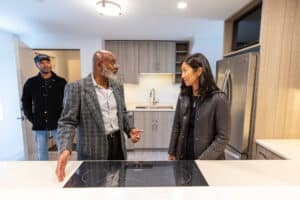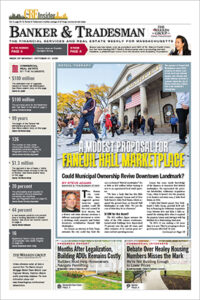
Roxbury resident Mark Kennedy, right, gives Boston Mayor Michelle Wu a tour of his recently-completed ADU on Oct. 18, 2023 during a media event intended to promote accessory dwelling units. Photo by Mike Mejia | City of Boston Mayor's Office
Five Boston-area banks have partnered with the city of Boston to offer zero-interest loans to Boston homeowners looking to add an accessory dwelling unit to their property.
In an announcement Friday, the Mayor’s Office of Housing said the product was intended to fill a gap in the loan market that might have prevented low- and moderate-income homeowners from financing ADU construction.
The loans will be offered by Leader Bank, Dedham Savings, South Shore Bank, Needham Bank, and The Cooperative Bank of Boston.
“ADUs give homeowners a way to create additional living spaces that can serve as a source of income, provide housing for family members, and help address the city’s housing needs. By making it easier to build ADUs, we are supporting residents, increasing housing supply, and strengthening neighborhoods,” city Chief of Housing Sheila Dillon said in a statement.
Owners of one- to three-unit homes who are below unspecified income and asset limits will be able to get ADU construction loans of up to $50,000 with 0 percent interest rates and deferred payments. They’ll also have access to technical assistance grants of up to $7,500 to pay for design, permitting and other pre-construction work. And a staffer with the Boston Home Center will be paired with eligible homeowners to monitor their project’s progress.
All that assistance will be vital for homeowners, as Mayor Michelle Wu’s administration has so far not followed through on her pledge in January’s State of the City speech to legalize owner-occupied accessory dwelling units city-wide. A guidebook for interested homeowners released by the city Friday makes clear many ADU projects will still have to get permission from the city Zoning Board of Appeal – a lengthy, often daunting process for people who aren’t real estate professionals. And a city analysis presented in early May described current ADU zoning as restrictive, and said if unchanged it would continue to prevent substantive numbers of ADUs from being built.
City zoning right now only allows ADUs to be carved out of existing buildings, either by subdividing existing homes or renovating basements and attics. Only about 150 of these “internal ADUs” have been built across the city since they became legal in 2019.
The now-Boston Planning Department launched a process in March to write zoning that fulfills the mayor’s pledge, and zoning in Mattapan was updated earlier this year to make it easier for homeowners there to build ADUs. However, no draft citywide zoning language was ever made public despite promises during the same May presentation that it would come out over the summer. Final zoning language was originally slated to come before the Boston Planning and Development Agency board of directors and city Zoning Commission this winter.
In a statement released along with the ADU loan announcement, new Chief of Planning Kairos Shen said his department is still working on “new complementary zoning that will make the process of adding an ADU more flexible and affordable,” but a city spokesperson did not return emails requesting additional information.






